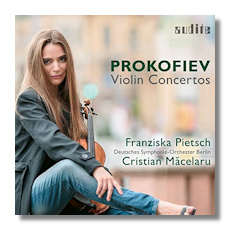
The Internet's Premier Classical Music Source
Related Links
- Prokofieff Reviews
- Latest Reviews
- More Reviews
-
By Composer
-
Collections
DVD & Blu-ray
Books
Concert Reviews
Articles/Interviews
Software
Audio
Search Amazon
Recommended Links
Site News
 CD Review
CD Review
Serge Prokofieff

Concertos for Violin
- Violin Concerto #1 in D major, Op. 19
- Violin Concerto #2 in G minor, Op. 63
Franziska Pietsch, violin
German Symphony Orchestra, Berlin/Cristian Măcelaru
Audite 97.733 50:07
East Berlin-born Franziska Pietsch took violin lessons from her father from age five and debuted at the Komische Oper Berlin at eleven. She studied violin with Werner Scholz and later, after gaining admittance to the West, with Ulf Hoelscher, Jens Ellermann and Dorothy DeLay, the latter at Juilliard. Ms. Pietsch, who is forty-eight years old as I write this, has appeared on several previous recordings of chamber music, but this is her first concerto album, arguably her signature step forward. I would have thought that someone with her extraordinary talent would have achieved international stardom sooner. Part of her difficulties came because her career was limited to the Eastern bloc early on and later she suffered reprisals in East Germany owing to her father's 1984 defection. She managed to get out in 1986, after which she was able to further her studies and develop her career. She is clearly a rising star and will likely be regarded as one of the more important German violinists of her generation.
Ms. Pietsch has a quite distinctive style of phrasing: she plays the opening theme of the Prokofiev First with very subtly applied dynamics, finding all sorts of nuancing as her volume recedes and swells caressingly with great sensitivity to the emotional flow of the melody, and she uses very slight, almost imperceptible portamento in a few places as the music grows in intensity. Her account of the opening theme is one of the best I've ever heard, and she plays the main theme of the finale in the same arresting manner. In the faster theme in the first movement her dynamics show even greater contrasts, sometimes to the point where the pianos are perhaps a little too soft. Pietsch turns quite ferocious and wild near the end of the development section, making the music more dramatic and powerful than is usually the case.
She is quite effective throughout the movement, and overall her rendition of the concerto is excellent. My only quibble is her handling of the chipper alternate theme in the finale: it lacks spirit in its subdued tones and only takes on energy toward the latter moments as the music builds to the joyous orchestral outburst. Elsewhere in the finale she is very effective, and her Scherzo has plenty of drive and acid, elements that must emerge in this delightful but menacing movement. The orchestra, under the deft leadership of Cristian Măcelaru, performs brilliantly throughout. I especially loved the playing by the bassoonist in the opening of the finale and that of the tubist in the Scherzo.
The Second Concerto, like the First, features tempos on the expansive side. Pietsch turns in a fine account once more, but again one notices that some of her softer playing is overdone, certain notes registering weakly. Still, this is fine artistry: the plentiful lyricism in the first two movements comes across with great feeling, a sense of passion. True, her phrasing of the beautiful alternate theme in the first movement is a little eccentric the second time around, but her way with the music here is convincing nevertheless, as subsequent hearings persuade you she finds subtlety and nuancing that others miss. She really digs in to the finale's main theme, slashing away with plenty of drive and color, shortchanging no aspect of the volatile and propulsive character of the music. The ending comes at you with a nearly frenzied energy, Pietsch handling the thorny passage with great skill and excitement, brilliantly setting up the arrival of those final chords that ring out paradoxically in their deliciously reckless but well planned finality. Again, the orchestra plays splendidly and with great spirit for Maestro Măcelaru. Indeed, I think this ensemble might just be as good as that other more famous Berlin orchestra – and I make that judgment not just on the basis of this but several other recent recordings as well.
Audite provides vivid, well balanced sound reproduction and fine notes in the album booklet. There are other excellent discs pairing performances of Prokofiev's two violin concertos by Oistrakh/various conductors, Chung/Previn, Mintz/Abbado, Perlman/Rozhdestvensky, Milstein/Giulini & Frühbeck de Burgos, Papavrami/Wit, Steinbacher/Petrenko, and Gluzman/Neeme Järvi. So, what's the best choice if you want both concertos on one disc? I wouldn't want to be without this new recording by Franziska Pietsch and company, though I also have other favorites that are hard to choose between and they include the Gluzman/Neeme Järvi (BIS), Steinbacher/Petrenko (Pentatone), and Perlman/Rozhdestvensky (EMI). This new Audite recording does have an edge orchestrally over most others, but the choice is still tough to make. Franziska Pietsch is certainly in the running here and you can't go wrong with her new disc, even if it doesn't clearly displace the others. Strongly recommended!
Copyright © 2018, Robert Cummings


















